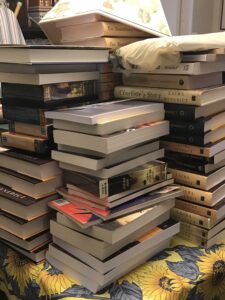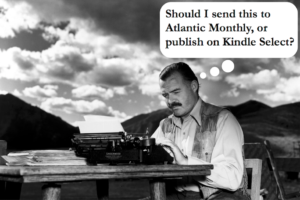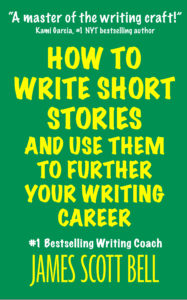by James Scott Bell
@jamesscottbell
 First thing I did when I decided to become a writer (even if I couldn’t learn like they told me in college, even if I failed) was go to a bookstore and buy a black coffee mug with WRITER on it. I wanted to look at it every day, and believe it. I don’t think I ever drank coffee from it. It’s still here in my office. I still look at it every day.
First thing I did when I decided to become a writer (even if I couldn’t learn like they told me in college, even if I failed) was go to a bookstore and buy a black coffee mug with WRITER on it. I wanted to look at it every day, and believe it. I don’t think I ever drank coffee from it. It’s still here in my office. I still look at it every day.
At first, when people would ask me, “So, what do you do?” I could never get myself to say, “I’m a writer.” I was still practicing law and running a small law book business. That’s really what I did to put food on the table.
Then I got published. Only when I had four or five books out there and a new multi-book contract was I comfortable enough to say “Writer.” Even then it took some getting used to.
That’s because the inevitable follow-up would be, “Oh! What do you write?”
“Fiction.”
“I love fiction. I wonder if I’ve read any of your books.”
I’d then be forced to give a few titles and watch the dead, uncomprehending eyes of my questioner blink, and see a half smile of abject pity crease her face.
Well, like the existentialists say, it is what it is. I’m better prepared now.
“What do you do?”
“I’m a writer.”
“Oh! What do you write?”
“Thrillers.”
“I love thrill—”
“Thanks! Here’s my card. You can check out my books on my website.”
So what about you? Do you feel comfortable calling yourself a writer?
Does there have to be a certain level of accomplishment first? (See Kay’s excellent reflections on “success.”)
Early on I clipped this from The Writer magazine. It’s by Malcolm Bradbury, from Unseen Letters: Irreverent Notes From a Literary Life:
I write everything. I write novels and short stories and plays and playlets, interspersed with novellas and two-hander sketches. I write histories and biographies and introductions to the difficulties of modern science and cook books and books about the Loch Ness monster and travel books, mostly about East Grinstead….I write children’s books and school textbooks and works of abstruse philosophy…and scholarly articles on the Etruscans and works of sociology and anthropology. I write articles for the women’s page and send in stories about the most unforgettable characters I have ever met to Reader’s Digest….I write romantic novels under a female pseudonym and detective stories…I write traffic signs and “this side up” instructions for cardboard boxes. I believe I am really a writer.
That’s how I felt at the beginning, though I quickly began to specialize in full-length thrillers. Even so, I love to write. Novels, novellas, novelettes, short stories, flash fiction, micro fiction. I’ve written a lot of nonfiction on the craft, starting with Writer’s Digest and moving from there to Writer’s Digest Books, to a spot on TKZ, and by publishing indie books on several aspects.
 And still I want to write more. There’s a kind of nonfiction piece that’s not easy to categorize, and as far as I know only two collections of such exist: Obituaries by William Saroyan, and Some People Are Dead by yours truly. You might call them Eclectic Musings, or Eccentric Escapades. But I’m calling them Whimsical Wanderings—Reflections From the Fringes of Normalcy. They are riffs that follow a random thought through a mind maze and into an unanticipated point.
And still I want to write more. There’s a kind of nonfiction piece that’s not easy to categorize, and as far as I know only two collections of such exist: Obituaries by William Saroyan, and Some People Are Dead by yours truly. You might call them Eclectic Musings, or Eccentric Escapades. But I’m calling them Whimsical Wanderings—Reflections From the Fringes of Normalcy. They are riffs that follow a random thought through a mind maze and into an unanticipated point.
You will find this on my Substack, and I’d like to invite you to join. Just type in your email and you’ll get it spam and ad free. For a paid subscription there’s extra content and a podcast, too. (Yes, podcast. Gilstrap isn’t the only one around here with a mellifluous voice!)
The purpose of all this is to provide a lift in the middle of your week, an oasis away from all the ranting and raving and name calling and general hooting.
So yes, I finally believe I am a writer.
Comments welcome.

 Edmund Burke, the eighteenth century member of Parliament known for his rousing speeches, regarded every word in a sentence as “the feet upon which the sentence walks.” He said that to alter a word—exchange it for a shorter or longer one, or give it a different position—would change the whole course of the sentence.
Edmund Burke, the eighteenth century member of Parliament known for his rousing speeches, regarded every word in a sentence as “the feet upon which the sentence walks.” He said that to alter a word—exchange it for a shorter or longer one, or give it a different position—would change the whole course of the sentence.

